
By STEVE HEISER
Ordinarily, Casey Lawrence displays a businesslike demeanor on the mound.
Some folks might even call him stoic.
Nov. 24, however, was not an ordinary day in the life of the Delone Catholic High School graduate.
Actually, it was quite extraordinary.
The unexpected flash of emotion that erupted from every pore of his body as he strode off the mound that day was an unmistakable testament to that fact.
After recording the final out of an inning, his teeth were clenched with intensity as he vigorously slapped his glove, before balling his right hand into a fist of triumphant jubilation. A voice was heard from the crowd, calling out: “Attaboy Casey.”
So, what was so special about that day for Lawrence?
It can be explained by the three letters emblazoned across the front of his jersey: USA.
That day, half a world away from his McSherrystown roots, the 37-year-old veteran of 15 professional baseball seasons was playing for his country. The ball was in his hands, and he had a chance to pitch his national team to a medal in a prestigious international tournament.
The often-overlooked journeyman, who had admittedly pitched with a “chip on his shoulder” for most of his baseball career, was determined not to fail.
His determination was rewarded. He did not fail that day. In fact, he enjoyed epic success.
Pitching in Japan’s Tokyo Dome in the Premier12 bronze-medal contest, Lawrence dominated Venezuela, throwing six shutout innings with seven strikeouts. He allowed just four hits and no walks. Team USA would win the game, and the bronze medal, 6-1.
That performance recently earned Lawrence the USA Baseball International Performance of the Year award.
“I was honored to wear the Team USA jersey,” Lawrence said. “To be able to go out there and perform like I did on that stage was pretty special. It was a little cherry on top to be honored that way and feel the love back from Team USA.”
As far as Lawrence is concerned, it’s the No. 1 accomplishment in a long and winding baseball career that’s included 59 major league appearances, including four big-league wins, as well as 105 minor-league victories. It’s a journey that’s taken him to nearly every corner of the nation, as well as international appearances in Mexico, Canada, Venezuela and Japan.
Lawrence described the Premier12 tournament in general, and the Venezuela game in particular, as “different” and “bigger” than anything he’d ever experienced. He couldn’t say enough good things about the “culture” that USA Baseball created.
“I always pitch to win the game, but to be surrounded by a whole group of individuals who thought the same way, it was easier to let that emotion out, because (his teammates and coaches) knew it wasn’t about just me, it was about us. It wasn’t forced. It just organically came out.”
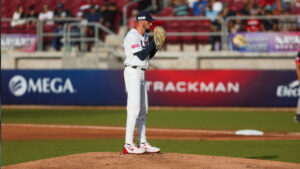
Premier12 Tournament: The Premier12 event is limited to players who are not currently on 40-man major-league rosters. As a result, the USA roster was an eclectic mix of promising young players and veterans, such as Lawrence. It included four of MLB Pipeline’s top 75 overall prospects, including’s Philadelphia’s Justin Crawford and Pittsburgh’s Termarr Johnson, as well as 44-year-old Rich Hill, who has 90 major-league wins.
Team USA was managed by Mike Scioscia, a two-time all-star and two-time World Series champion as a player, who was also a longtime major-league manager for the Angels. For the U.S. team, the Premier12 tournament started in Mexico, with pool-play action. The Americans and Venezuelans advanced from the Group A pool in Mexico to compete against Chinese Taipei and Japan of Group B. Chinese Taipei eventually won the gold medal with a 4-0 win vs. Japan.
It was the third time that the event was held, and it was the second time the USA won a medal. The Americans took silver in 2015. The event features the 12 highest-ranked national teams in the world and is held by the World Baseball Softball Confederation.
Lawrence made two starts in the tournament and finished with 1.93 ERA in the event.
Team USA experience: For Lawrence, the Team USA experience was different, and more rewarding, than pitching in the minors, where developing talented young players with 100 mph arms can often trump winning games.
“It didn’t matter what your velocity was, or how much the ball was moving. It was just ‘are you getting outs or not.’ That’s what it comes down to and that’s what I enjoy about baseball,” said Lawrence, whose fastball tops out at about 92 mph these days. “Every inning, every pitch is so much more magnified. That’s why Team USA is special. It’s not about individual stats. It’s just win.”
When Lawrence was first approached about possibly pitching in the Premier12 Tournament, he wasn’t sure he wanted to do it. It would mean spending time away from his wife, Sarah, and his two young children, Haven, 3, and Paxton, 1.
“I talked to Sarah for five minutes and she said, ‘it’s Team USA, you gotta do it.’ So, I’m like, yeah, it’s a no-brainer,” Lawrence said.
Lawrence spent last year pitching at the AAA level with the Seattle Mariners organization and recently signed a deal to remain with the Mariners organization for the 2025 season. The folks with the Mariners fought hard to get him a spot on Team USA and he rewarded their faith with one of the best performances of his career.
High school and college: The road to Tokyo, and his award-winning performance in the Premier12 event, was not easy.
Lawrence was a three-sport standout at Delone, playing basketball and golf, in addition to baseball. But he wasn’t a big-time prospect in any of those sports. In basketball, the sharp-shooting guard missed most of his junior season because of a broken wrist. In baseball, his high-school fastball topped out at a modest 78-80 mph.
The scouts, college or pro, weren’t exactly knocking down his door. It’s where the “chip on his shoulder” started to grow.
With no major college offers, he elected to attend Albright, an NCAA Division III program in Reading, Berks County. One of Albright’s big selling points was that he could play both baseball and basketball, and he did just that as a freshman.
With the help of his Albright baseball coaches, however, he was able to boost his fastball to near 90 mph, which translated into a lot of success on the mound. In basketball, meanwhile, he was mostly coming off the bench during an injury-plagued freshman season.
It became apparent that baseball was his better career path, and he chose to concentrate on that sport and give up basketball — a sport that he dearly loved.
“It was probably the hardest decision I ever made in my life,” he said.
The decision paid off. At Albright, he finished his career with an 18-8 overall record and a 2.81 ERA. In addition, during his summers, he competed in the Atlantic Collegiate Baseball League vs. numerous Division I players. He excelled there, winning championships and making all-star teams.
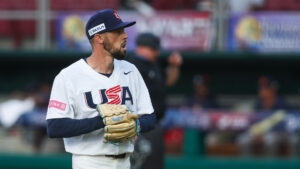
Life in the minors: Those performances earned him some attention from major league teams, but ultimately, none would draft him, just adding to the “chip on his shoulder.” He was determined to prove his doubters wrong.
“I never wanted to be complacent, because If I got complacent, someone else would catch up,” Lawrence said. “I’ve always tried to have that chip on my shoulder as an underdog. Nobody wanted to draft you. You don’t think I can do it? OK. Here we go.”
Finally, the Toronto Blue Jays offered him a free-agent minor-league deal after his senior season at Albright. There was no bonus, however, and he made less than $1,000 per month. Financially, it was far from lucrative.
After agreeing to that deal, his introduction to pro ball proved less than encouraging.
“Tuesday after the draft I got the call. Wednesday morning, I leave (for Toronto’s complex in Florida). I get down there and take my physical. I don’t know anything about pro baseball at all. I threw a bullpen session. Then, I was the last one in the complex. Not another soul in the building. The complex is like a 10-minute drive from the hotel. I was the last one at the field. There was no Uber or anything back then and I ain’t got no money. So, I got my suitcase, and I walked back to the hotel. It was hours (of walking). It took me forever.”
Despite that less-than-promising beginning, it still marked the start of a long, and mostly successful, minor-league career. During the first seven years, while he was still on his rookie deal and under team control, it also meant very low pay and very long bus rides, while often living in dormitory-style rooms with multiple teammates.
Despite mostly solid seasons, Lawrence’s minor-league journey, however, did have some bumps in the road.
He consistently had to watch top draft picks, whose pitching numbers didn’t match Lawrence’s statistics, get promoted ahead of him because they could reach triple digits on the radar gun or the team had more money invested in them.
Then, in 2016, he briefly started to get hit around with regularity. Doubts started to creep in. It got so bad that he considered giving up the game he loved.
“He said ‘I’m not sure if this is for me,’” his father Wayne recalled about a conversation he had with Casey when he was at rock bottom.
Casey’s mother, Sharon, added: “There were lots of prayers from the mama.”
The prayers, eventually, would be answered.
“I was stuck at AA and I wasn’t getting promoted to AAA. I had a horrible start vs. Altoona. I was in a funk,” Casey said. “After the game, I’m sitting down with the pitching coach and he said ‘you know I love you, but we got to change something or you ain’t going to be around much longer.’ I agreed, because I don’t like getting my rear end kicked. So, I said, ‘what do you got?’ He said, ‘come in tomorrow and we’ll get to work.’ I said ‘deal.’ It probably took a month, but my velocity started ticking up. I started to lose my control a little (which was unusual for Lawrence, who normally thrived on good location), but they said ‘don’t worry about it, you’re on the right track.’ By the end of year, I was pitching really well and my velocity jumped to 92-94 (from 88-90) and the slider was better.”
Making the majors: Just a year later, in 2017, he made his major-league debut with Toronto.
By that time, he’d also become a free agent and could negotiate and sign with any team of his choosing. That meant considerably larger paydays. Combined with playing winter ball in Valenzuela, he was finally making some decent money. It also meant that he no longer had to live with his parents in McSherrystown in the offseason.
“My first year outside of my rookie deal, I made like $12,000 a month. It was a huge jump,” Casey said. “You’re not rich, but you feel like you’re rich after making $6,000 for a year.”
Things were definitely starting to look up. From 2017 through 2023 he made numerous major-league appearances with Toronto, Seattle and St. Louis, going a combined 4-4 with a 6.75 ERA, mostly in long-relief appearances.
During that same period, in 2019, he also spent a year in Japan.
“It was an awesome experience,” Casey said. “The people were unbelievable. The food was amazing. Baseball is different. It’s played differently. Practice is different. It’s thought about in a different way. The manager over there is the kingpin. He’s the guy. He controls the organization. It took a little bit to get used to. You’re always talking through an interpreter, so it’s hard to get to know your teammates.
“I didn’t get the opportunity I thought I would get to pitch at their major-league level, but I got paid very well, so that was a big selling point. Financially, how could I turn it down? It sets me up pretty good, if I’m smart. I’d do it again, in a heartbeat. We really grew to love it.”
“It takes a village:” Casey is the first to admit that his road to baseball success wasn’t done alone.
“It takes a village,” he said.
Casey was especially grateful for the contributions of his parents and his wife, all of whom are also Delone graduates.
“If I didn’t have mom and dad helping me, I don’t know how I would’ve made it,” he said. “I saw some guys who didn’t have that kind of structured help who didn’t make it.”
“Even to this day, they drive to spring training and stay the whole spring to help with the kids and give support. They drive (my car) from spring training to the city I’ll be at. … I wouldn’t be able to it without them.”
His parents, meanwhile, deflected the praise back to Casey.
“Our job is to give him the opportunity,” Wayne said. “It’s up to him to carry it and take off, which is what he did. This has been him. He’s done some pretty amazing things. … I knew it was inside of him”
Both Wayne and his wife come from an athletic background. Wayne, also known as Tree, played baseball in high school and college and was Casey’s youth coach. Casey’s mother, Sharon, also known as Ched, was a basketball player at Delone.
“We’re sports people,” Ched said. “We love the excitement of it all. … We always wanted to travel and now we’re traveling to different places to watch him play. I Give Sarah (Casey’s wife) a lot of credit, because every place you go you have to make it your home.”
Casey’s wife is a nurse. She’s now employed in the telehealth field, which allows her to work remotely, allowing her to travel with Casey and their children.
“Before we dated, she said she never wanted to date an athlete,” Casey joked about his wife.
Sarah, however, has adjusted quickly to life as the wife of an athlete. They married in 2016 and live in the Hanover area.
“Minor league ball is not for the weak-minded,” Casey said. “The travel, the time, away from home, early mornings, late nights. It’s a grind for everybody involved. We wouldn’t have worked if Sarah didn’t make the sacrifices she made. It wouldn’t be feasible. Now she is getting some of the rewards, like working from home and getting to travel.”
Becoming a parent has also helped to change Casey’s perspective on life and baseball.
“I used to be really hard on myself, trying to separate baseball life and personal life. I’d bring it home, 100%. And that was part of the struggle I had in 2016. I had some bad outings and it would boil over. Now, with Paxton and Haven, the minute I get out the clubhouse door, they come running to me, so it’s easy now to sit it aside. I don’t forget about it. It’s still there. But I can sit it aside.”
Casey also made sure to express gratitude to his coaches along the way, including his uncle, Dave, who served as his pitching coach at Delone, as well as his head coach at Delone, Alan Felix. He also emphasized the continued support he still receives from the McSherrystown/Delone community.
“In the back of my mind, I’m always thinking about McSherrystown, Hanover, Adams County. You know you’re doing this for more than yourself,” Casey said.
“Staying connected to my roots allowed me to stay grounded and not get too big of a head and I think that was big. Coming from a small town was good for me in creating values. Pretty much everyone one I’ve come in contact with has played a part.
“I’ve tried to go about it the right way. I’m always thinking, ‘I don’t want to embarrass the area or my family.’”
In the offseason, Casey has also made it a point to help young athletes in the Hanover area. He served as an assistant basketball coach at Delone under Jim Dooley for a bit, and he’s also given some pitching lessons.
“He’s really been a role model for the local kids that he has worked with,” Wayne said. “They really look up to him. He enjoys that and he’s very level-headed. He doesn’t throw that major-league swagger around.”
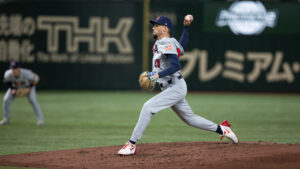
His future: Casey remains highly competitive and has no plans to give up on pitching in the foreseeable future, even at an age when many pro players are already retired. He talks about pitching until he’s 40, and maybe beyond.
“I talked with some baseball folks that I trust about my future and their advice was to play as long as you can,” he said. “The goal is still to get back to majors. (For that to happen), things have to go well. I have to throw ball well at the right time and there has to be an opportunity.”
Once he finally does leave the mound, however, he wants to continue his involvement in the game, either as a coach, a manager or in the front office.
“Managing interests me. I love pitching, but I love culture and the idea of putting together a team,” he said. “That’s why Team USA was so perfect for me. Trying to win. Putting together different personalities and making them cohesive. The front office is interesting to me because that’s where the power is. I’ve had a lot of good conversations with high-level front-office folks, and they think that I could be good in that area.”
Nothing that Casey does after his pitching career ends will surprise his father.
“When he was growing up, he would have his own teams on Xbox and would manage his guys,” Wayne said. “I know that’s his dream, to be a front-office guy with the control to make decisions. He would (also) be great at grooming young players as a pitching coach (or manager). He wants to have control. He’s a baseball guy.”
No matter what his post-pitching future holds, however, Lawrence will be able to look back on an unlikely playing career that’s included some peaks and valleys, but ultimately has been more wildly successful than anyone could’ve predicted when he left Delone nearly two decades ago with no major college offers and a fastball that didn’t crack 80 mph.
“I’m appreciative of the journey. It’s been rewarding and fun,” Casey said. “My biggest fear is not being prepared, so I’ve always been overly prepared. Because I couldn’t afford not to be prepared. I’ve never gone into the spring with a job. I’ve always had to earn it. And that’s what made it more rewarding.”
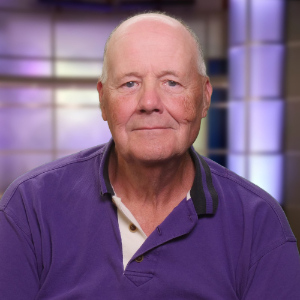
Steve Heiser is a lifelong Adams County resident who has nearly four decades of sports journalism experience as a reporter and editor.
 Community Media of South Central PA Celebrating Community
Community Media of South Central PA Celebrating Community


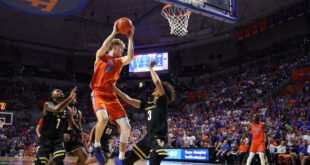
Great article! Thanks for sharing Casey’s story with us.
Outstanding writing of a young man’s dream that through hard work eventually had a good ending. I can appreciate it all
Congratulations Casey and nice article Steve!